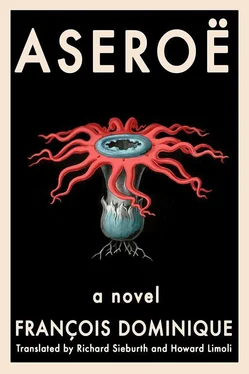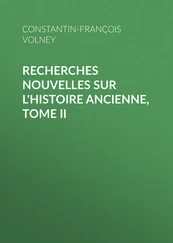François Dominique - Aseroë
Здесь есть возможность читать онлайн «François Dominique - Aseroë» весь текст электронной книги совершенно бесплатно (целиком полную версию без сокращений). В некоторых случаях можно слушать аудио, скачать через торрент в формате fb2 и присутствует краткое содержание. Город: New York, Год выпуска: 2020, ISBN: 2020, Издательство: Bellevue Literary Press, Жанр: Современная проза, на английском языке. Описание произведения, (предисловие) а так же отзывы посетителей доступны на портале библиотеки ЛибКат.
- Название:Aseroë
- Автор:
- Издательство:Bellevue Literary Press
- Жанр:
- Год:2020
- Город:New York
- ISBN:978-1-942658-78-8
- Рейтинг книги:5 / 5. Голосов: 1
-
Избранное:Добавить в избранное
- Отзывы:
-
Ваша оценка:
- 100
- 1
- 2
- 3
- 4
- 5
Aseroë: краткое содержание, описание и аннотация
Предлагаем к чтению аннотацию, описание, краткое содержание или предисловие (зависит от того, что написал сам автор книги «Aseroë»). Если вы не нашли необходимую информацию о книге — напишите в комментариях, мы постараемся отыскать её.
Aseroë — читать онлайн бесплатно полную книгу (весь текст) целиком
Ниже представлен текст книги, разбитый по страницам. Система сохранения места последней прочитанной страницы, позволяет с удобством читать онлайн бесплатно книгу «Aseroë», без необходимости каждый раз заново искать на чём Вы остановились. Поставьте закладку, и сможете в любой момент перейти на страницу, на которой закончили чтение.
Интервал:
Закладка:
| 1. | Successive editions in 43 languages | 10.1 million |
| 2. | Public and private sales of manuscripts and original editions | 3.5 million |
| 3. | Publication of critical and biographical essays by researchers who owe their careers, whether in France or abroad, solely to the accumulation of Rimbaud factoids (minus the cost of theses, travel, and secretarial help) | 40.5 million |
| 4. | Radio, TV, and movie adaptations dedicated to the life and works of the same author | 54.5 million |
| 5. | The traffic in booklore realized on the products mentioned in categories 1 and 3 | 4.2 million |
| 6. | Photos, posters, badges, medallions, and handbills | 1.0 million |
| Total: 113.8 million |
Something on the order of the annual salary of a senior executive at the Google Alphabet Holding Company. So you’ve turned a profit on young Rimbaud’s death. But has it really paid off big? Nothing, compared to the new social media and financial sectors.
That’s why Yves Bonnefoy is right to see in the above-quoted Rimbaud poem entitled “Sale” (from Illuminations ) a cynical commercial metaphor signifying “the corruption of the initial aspirations of the poet into shabby, finite and inert objects.” He’s absolutely right, provided you include the royalties collected by Yves Bonnefoy in the total 113.8 million of the Rimbaud enterprise account, not to mention the one-thirteenth of royalties that some courageous publisher will have to refund me for publishing this book. (Since Rimbaud isn’t cited in the other chapters, I’ll keep this pittance for myself.)
In a very different world, I would be happy to see an end to the posthumous sale of sacred and profane relics, and to the neglect of the precious remains, in favor of the often trivial but deeply stirring forms of life—such as an actual face, an actual encounter, or a true handshake.
If it takes too long for that to happen, I’d rather breathe my last than witness the throng of flunkies jostling one another on the slopes of profane Golgothas, fighting over the corpses of people they wouldn’t really want to associate with anyway—phony admirers of the dead.
But as for death itself, so sweet, so calm, so eternally betrothed, why avoid it? I certainly wouldn’t.
It doesn’t matter much to me whether the poet (Rimbaud himself) swallowed or spit out the holy wafer during his last rites. Instead, I’d rather find out for what amazing reason nobody has said anything about his words , the dying last words of the Living Man, whispered into a confessor’s ear. Is it out of respect for a secret considered untouchable? That would surprise me on the part of those who are partial to silence and lacunae. Or is it, rather, because of the belief, academic and hagiographic in nature, that nothing remains of great men except their written traces? In any case, nobody has bothered to find out what the much-vaunted troubled priest actually heard from the mouth of Rimbaud.
In this significant oversight I sense the visceral fear of imagining, through others’ examples, the frightening spectacle of one’s own death rattle and, at the same time, the embarrassed indifference—mingled with a genuine pity—that one is supposed to feel for that deplorable state: the unhealthy delirium of any ordinary dying soul or the discreet disgust that one also feels for any stricken brain, now rendered commonplace by so much suffering.
Finally, if the Rimbaud cultists had taken seriously their own lyrical flights with regard to the Illuminations , they would have shown more interest in his last words, fallen upon the ears of a priest.

I’m afraid the moment has come to describe another experiment. The method, the procedures that I’m here deploying might seem, at first, to resemble those of the hagiographers whose ill-fated effects I have just criticized, but what I have found, what I am in a position to offer, cannot be enclosed within the circle of chance or power.
Arthur Rimbaud entered the Hôpital de la Conception in Marseille on May 20, 1891. He informed his mother and his sister of this in a telegram dated the next morning, which spoke of the extreme gravity of his condition:
Monday morning, amputation of my leg. Near death .
In a word, our life is an unending misery! So why do we exist? (Letter written to his sister Isabelle, June 23)
I shall go to my grave, while you shall walk in the sun . (Isabelle’s notes, Sunday, October 4)
Next, the business with the chaplains—the last communion and confession. I paused over this passage of Isabelle’s letter to her mother, dated Wednesday, October 28, 1891:
He’s saying strange things, very softly, in a voice that would cast a spell over me if it weren’t so heartrending. What he’s saying are dreams—yet it’s not at all the same as when he’s delirious with fever. It’s almost as though, and I really believe this, he’s doing it on purpose.[My emphasis.]
As he was murmuring these things, the nun said to me in a low voice: “So he’s lost consciousness again?” But he heard everything and he blushed deeply; he didn’t say anything more, but, once she was gone, he said this to me: “They think I’m crazy. Do you agree?”—“No, I don’t think so….”
You can’t accuse Isabelle Rimbaud of inventing myths at this particular conjuncture. Still reeling under the effects of her emotions, she hadn’t distanced herself sufficiently to begin elaborating the posthumous legend of her brother. On the other hand, it’s possible to compare the preceding letter to her recent reading of the Illuminations , whose “supernatural visions” she evoked in a letter sent on October 12 to Paterne Berrichon. As for visions, the very last message from the poet—in a letter that he dictated to Isabelle on November 9 to the director of Messageries Maritimes (a shipping company)—resembles the invoice of the Labatut caravan more than it does the Illuminations:
one lot: a single tusk
one lot: two tusks
one lot: three tusks
one lot: four tusks
one lot: two tusks.
Tell me when I’m to be carried on board.
All this is well known, all this has been glossed by voluminous scholarly commentary, but nobody has looked into the confession itself. In the letter to her mother of Wednesday, October 28, 1891, Isabelle wrote:
When the priest left, he said to me, looking at me with a strange, troubled look, “Your brother has faith, my child, what in the world were you telling me! He has faith, and what’s more, I’ve never seen such faith.”
A December 30 letter to Paterne Berrichon speaks of two confessions. The Rimbaud zealots have run on endlessly about faith—which wasn’t the real issue. That question’s only real purport was to shore up two legendary sagas: the religious one, fostered by Paul Claudel, and the profane one, fostered by the Surrealists. Both sides based their interpretation on the Seer, the Alchemy of the Word. If the worshippers had for one moment believed in the power of words in any sense other than posthumously, they would have pondered the effects of Rimbaud’s final confession.
In early December, I went to Marseille to visit the official archives in order to consult the registers of the former Hôpital de la Conception. During one brief hour of research, I found the names of the chaplains assigned to ministering to the patients during the fall and winter of 1892. There were three of them: Abbés Claude Girard, Louis Servin, and Anselme Coulemas of the secular order in the Marseille diocese.
Читать дальшеИнтервал:
Закладка:
Похожие книги на «Aseroë»
Представляем Вашему вниманию похожие книги на «Aseroë» списком для выбора. Мы отобрали схожую по названию и смыслу литературу в надежде предоставить читателям больше вариантов отыскать новые, интересные, ещё непрочитанные произведения.
Обсуждение, отзывы о книге «Aseroë» и просто собственные мнения читателей. Оставьте ваши комментарии, напишите, что Вы думаете о произведении, его смысле или главных героях. Укажите что конкретно понравилось, а что нет, и почему Вы так считаете.












